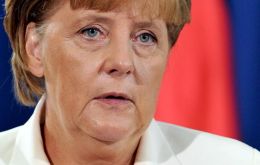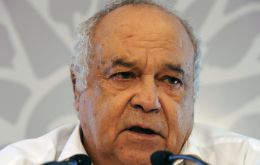MercoPress. South Atlantic News Agency
Economy
-
Tuesday, March 26th 2013 - 21:55 UTC
Argentina’s tax office targets main grain exporters; demands 951 million dollars in alleged arrears

Cargill Inc. and Bunge Ltd. are among grain exporters that allegedly owe the Argentine government 951 million dollars in taxes and won’t be eligible for a reduced interest rate under a payment plan unveiled by the government this week.
-
Tuesday, March 26th 2013 - 21:33 UTC
Setback in New York court for Argentina’s strategy in its battle with bond holdouts

A US court in New York on Tuesday rejected Argentina's request for a full-court rehearing of an appeal it lodged as it struggles to shake off holders of 1.3 billion dollars in defaulted bonds.
-
Tuesday, March 26th 2013 - 20:35 UTC
Cyprus aftermath: Germans fear about their savings accounts despite ‘Euro-supreme’ Merkel

A majority of Germans doubt Chancellor Angela Merkel's guarantee that their savings accounts are safe, an opinion poll published by Stern magazine and RTL TV showed, six months before the federal election.
-
Tuesday, March 26th 2013 - 05:48 UTC
BRICS summit to discuss creation of development bank with 50bn initial capital

Brazilian President Dilma Rousseff will attend this week's BRICS summit of five emerging powers hosted by South Africa to discuss creation of their own development bank, the Planalto office announced.
-
Tuesday, March 26th 2013 - 05:04 UTC
Falklands/Malvinas discussions between UK and Argentine lawmakers

Lawmakers from Argentina and the UK attending the 128th Inter-parliamentarian Union assembly held in Ecuador have been holding intense but ‘respectful’ discussions about the Falklands/Malvinas sovereignty dispute.
-
Tuesday, March 26th 2013 - 05:02 UTC
Brazilian supermarkets will not sell meat from cattle raised in Amazon rainforest

The main group representing supermarkets in Brazil says it will no longer sell meat from cattle raised in the rainforest. The Brazilian Association of Supermarkets, which has 2,800 members, hopes the deal will cut down on the illegal use of rainforest for pasture.
-
Tuesday, March 26th 2013 - 05:00 UTC
Bernanke defends low-interest rates arguing they help to boost the global economy

Ben Bernanke has defended the continuing low-interest-rate policies of the US Federal Reserve and central banks in Europe, saying they are helping to boost the global economy. The Fed governor's comments come after some analysts have voiced concern that such low rates are cutting the value of currencies of advanced nations.
-
Monday, March 25th 2013 - 05:16 UTC
EU, ECB and IMF agree on a deal to bailout Cyprus; no Parliament vote

Euro-zone finance ministers have agreed a deal on a 10bn-Euro bailout for Cyprus to prevent its banking system collapsing and keep the country in the Euro-zone. Asian financial markets rose in early trading on news of the deal.
-
Monday, March 25th 2013 - 04:45 UTC
Falklands ‘a NATO base’ and the referendum ‘unacceptable and ridiculous’, says Uruguay

Two of Uruguay’s President Jose Mujica closest ministers, Defence and Foreign Affairs said that the ‘British occupation’ of the Falkland Islands is ‘unacceptable’, represents a NATO base in the South Atlantic and described the recent referendum in the Islands as ‘absurd and ridiculous’.
-
Monday, March 25th 2013 - 01:26 UTC
Falklands: 'Yes' vote means 'we don’t want to be colonized by Argentina'

A delegation from the Falkland Islands recently visited Jamaica as part of a tour of North America, Central American and Caribbean countries to inform about the referendum earlier this month which resulted in a resounding 'yes' with only three 'no' votes, leaving no doubt as to their wish to remain a British Overseas Territory.
